- United States
- /
- Semiconductors
- /
- NasdaqGS:GSIT
Is GSI Technology (NASDAQ:GSIT) In A Good Position To Deliver On Growth Plans?
There's no doubt that money can be made by owning shares of unprofitable businesses. For example, although Amazon.com made losses for many years after listing, if you had bought and held the shares since 1999, you would have made a fortune. Having said that, unprofitable companies are risky because they could potentially burn through all their cash and become distressed.
So should GSI Technology (NASDAQ:GSIT) shareholders be worried about its cash burn? For the purposes of this article, cash burn is the annual rate at which an unprofitable company spends cash to fund its growth; its negative free cash flow. We'll start by comparing its cash burn with its cash reserves in order to calculate its cash runway.
View our latest analysis for GSI Technology
How Long Is GSI Technology's Cash Runway?
A company's cash runway is calculated by dividing its cash hoard by its cash burn. In June 2024, GSI Technology had US$22m in cash, and was debt-free. In the last year, its cash burn was US$18m. That means it had a cash runway of around 15 months as of June 2024. That's not too bad, but it's fair to say the end of the cash runway is in sight, unless cash burn reduces drastically. The image below shows how its cash balance has been changing over the last few years.

How Well Is GSI Technology Growing?
Some investors might find it troubling that GSI Technology is actually increasing its cash burn, which is up 9.6% in the last year. Also concerning, operating revenue was actually down by 21% in that time. Taken together, we think these growth metrics are a little worrying. In reality, this article only makes a short study of the company's growth data. You can take a look at how GSI Technology has developed its business over time by checking this visualization of its revenue and earnings history.
How Hard Would It Be For GSI Technology To Raise More Cash For Growth?
GSI Technology revenue is declining and its cash burn is increasing, so many may be considering its need to raise more cash in the future. Companies can raise capital through either debt or equity. One of the main advantages held by publicly listed companies is that they can sell shares to investors to raise cash and fund growth. We can compare a company's cash burn to its market capitalisation to get a sense for how many new shares a company would have to issue to fund one year's operations.
Since it has a market capitalisation of US$79m, GSI Technology's US$18m in cash burn equates to about 23% of its market value. That's not insignificant, and if the company had to sell enough shares to fund another year's growth at the current share price, you'd likely witness fairly costly dilution.
Is GSI Technology's Cash Burn A Worry?
On this analysis of GSI Technology's cash burn, we think its cash runway was reassuring, while its falling revenue has us a bit worried. Summing up, we think the GSI Technology's cash burn is a risk, based on the factors we mentioned in this article. Taking a deeper dive, we've spotted 3 warning signs for GSI Technology you should be aware of, and 1 of them is a bit unpleasant.
Of course GSI Technology may not be the best stock to buy. So you may wish to see this free collection of companies boasting high return on equity, or this list of stocks with high insider ownership.
New: Manage All Your Stock Portfolios in One Place
We've created the ultimate portfolio companion for stock investors, and it's free.
• Connect an unlimited number of Portfolios and see your total in one currency
• Be alerted to new Warning Signs or Risks via email or mobile
• Track the Fair Value of your stocks
Have feedback on this article? Concerned about the content? Get in touch with us directly. Alternatively, email editorial-team (at) simplywallst.com.
This article by Simply Wall St is general in nature. We provide commentary based on historical data and analyst forecasts only using an unbiased methodology and our articles are not intended to be financial advice. It does not constitute a recommendation to buy or sell any stock, and does not take account of your objectives, or your financial situation. We aim to bring you long-term focused analysis driven by fundamental data. Note that our analysis may not factor in the latest price-sensitive company announcements or qualitative material. Simply Wall St has no position in any stocks mentioned.
About NasdaqGS:GSIT
GSI Technology
Designs, develops, and markets semiconductor memory solutions for networking, industrial, test equipment, medical, aerospace, and military customers in the United States, China, Singapore, Germany, the Netherlands, and internationally.
Flawless balance sheet with very low risk.
Similar Companies
Market Insights
Community Narratives



